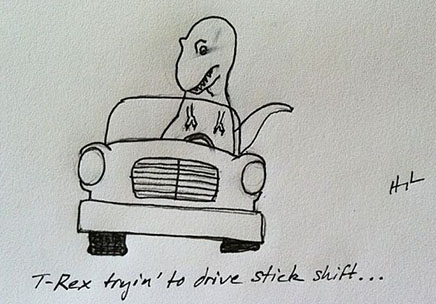Take pride in your funnies
 The old saying goes, “everybody’s a comedian.” I have known this to be true for some time. One on one, you’ll find that I crack jokes often, always going for a laugh. When in the presence of a larger crowd, one might find that my disposition changes drastically. That’s because instead of joking for the amusement of all, it seems a group belches anything that remotely resembles comedy in a free for all. The quality of a joke is lost as soon as it’s used as a tool for attention. Jokes are gifts to lighten the hearts of others. When the gift is imposed on the self, its purpose is defeated! Despite this truth, I believe anybody would agree they would rather have a bad joke be lauded than a good joke go unappreciated. Therefore, the bulk of the jokes I hear today are quick one-liners aimed to get a forced laugh from as many idle ears as possible. It’s lazy comedy, and it’s the cardinal sin of any comedian. Two come to mind: references and puns.
The old saying goes, “everybody’s a comedian.” I have known this to be true for some time. One on one, you’ll find that I crack jokes often, always going for a laugh. When in the presence of a larger crowd, one might find that my disposition changes drastically. That’s because instead of joking for the amusement of all, it seems a group belches anything that remotely resembles comedy in a free for all. The quality of a joke is lost as soon as it’s used as a tool for attention. Jokes are gifts to lighten the hearts of others. When the gift is imposed on the self, its purpose is defeated! Despite this truth, I believe anybody would agree they would rather have a bad joke be lauded than a good joke go unappreciated. Therefore, the bulk of the jokes I hear today are quick one-liners aimed to get a forced laugh from as many idle ears as possible. It’s lazy comedy, and it’s the cardinal sin of any comedian. Two come to mind: references and puns.
I don’t know if I’ve ever been amused by a pun before. Don’t get me wrong, sometimes I am impressed with their cleverness, or I appreciate how well-crafted one has been put together, but in all honesty I’ve never heard one and thought, “What fun! More please!” A pun is less a joke and more an algorithm. They forgo the common (and most important) rituals of a joke like timing, set up or emphasis. Instead, making a pun is more like a scavenger hunt for words of likeness. Once you have the necessary ingredients, voilà! The joke is in your hands and no more work is required.
Normally, I wouldn’t get so fumed from some puns, but they’re becoming more lazy. If you can believe it, the premise of a pun is being compromised to be made easier. An eruption of has appeared lately because they’re easy to make, easy to distribute and since nobody takes them seriously, easy to forgive the poor soul who thought they did a good job making the pun. Hence, they’re perfect for internet comics with the least bit of time and lust for attention. One of the laziest puns is a T-rex that cannot complete an action because he has small arms. That’s the joke! I couldn’t begin to tell how often I’ve seen comics of a T-rex just reaching for something. That’s not a joke, it’s a travesty.
Speaking of travesty, references for laughter’s sake aren’t any better. It’s interesting to think that someone can say, “remember slap-on bracelets?” and we laugh. We laugh when we hear a pop culture reference out of nostalgia, we remember enjoying it, so we laugh at the referenced rather than the reference. Laughing at a pop culture reference also shows that we understand it. It creates a sense of inclusion; we don’t want other people to think we didn’t get the reference, so we laugh to show that, we, too, understand; we, too, know our culture. This also follows the algorithm, and I think it’s even easier than making a pun. Probing someone’s mind for a memory of a pop culture item, especially in our world of infinite connectivity to entertainment, makes for a fish-in-a-barrel type joke. What’s more, they’ll never die as long as we can relate to our peers through pop culture items.
All that set-up nonsense is too much to think about when there’s attention to be had. Puns and references just fit the YouTube generation so well; I’m probably rattling for naught. If anything, I won’t be endorsing memes nearly as often. If it takes 200 before my comedic appetite is mildly sated, then they can’t be regarded as an effective form of comedy. Humor is created by the subversion of expectation. And still we laugh at puns and references, the most predictable jokes. But then, [all that set-up nonsense…]
